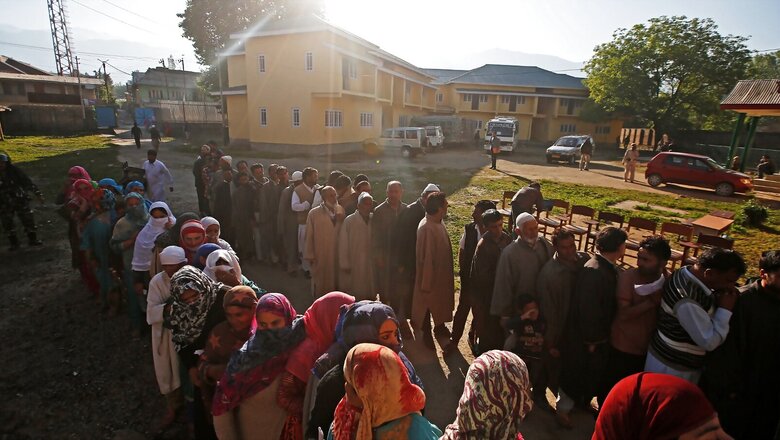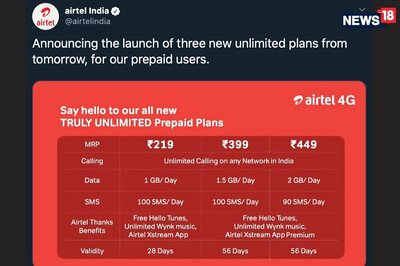
views
Two major political developments have taken place in Jammu and Kashmir this week. Farooq Khan, who retired as an officer of the rank of Inspector General of Police in 2013, resigned over a signal from New Delhi as advisor to Lieutenant General Manoj Sinha. Vikramaditya Singh, son of the veteran Congress leader Dr Karan Singh and grandson of Jammu and Kashmir’s last Dogra monarch, Hari Singh, resigned from the Congress party.
Khan’s resignation came a day after Union Home Minister Amit Shah’s visit to Jammu, his second to J&K in the last six months. Reports in local newspapers suggesting Khan being given “an important position in the BJP ahead of the Assembly elections” were quickly neutralised by a Srinagar datelined story in The Times of India. It indicated that the BJP’s central leadership was not happy over the grass growing under Khan’s feet.
According to the report, not contested till date, one of Khan’s long-time aides has amassed properties worth crores of rupees hugely disproportionate to his known sources of income. The officer, who has been attached to Khan since the days of his posting as Superintendent of Police in Special Operations Group (SOG) of the Jammu and Kashmir Police, is reportedly now an Inspector.
Khan’s grandfather has been associated with the BJP’s precursors in Jammu since Partition, but he was never clubbed with any political party until he joined the BJP at Narendra Modi’s election rally at Hiranagar in March 2014. Modi praised him for his high-profile role on the counterinsurgency front. He was appointed as the BJP’s in-charge in the north-east. Subsequently, he was inducted as Administrator of Lakshadweep.
After termination of the PDP-BJP coalition in 2018, Khan was appointed as an advisor to the Governor in Jammu and Kashmir. A number of the retired IAS and IPS officers kept coming and going as advisors but Khan retained his position without break even after the erstwhile state was reorganised and the Governor was reduced to the rank of L-G.
If whispers in the corridors of power in Jammu are to be believed, Khan was not enjoying a very good relationship with the L-G. Some bureaucratic sources insist that immediately after the Assembly elections in the UP and four other states, J&K’s Raj Bhavan has sought CBI inquiries into certain matters handled by a former L-G and some advisors.
Khan is a permanent resident of Jammu and he has been seen as the BJP’s Muslim face even as his rapport with the community in the Muslim-dominated segments has been limited. His landing into oblivion would mean that the BJP was expecting little from the UT’s Muslim territories.
Vikramaditya has retained his family’s influence over a section of the Rajput vote-bank even as Dr Jitendra Singh, Minister of State in the Prime Minister’s Office, and his brother Devinder Singh Rana, who has lately shifted from the National Conference (NC) to the BJP, have been election winners after 2014.
Vikramaditya’s brother Ajatshatru Singh joined the BJP in 2015 after a long association with the NC. He worked as a minister in Farooq Abdullah’s NC government in 1996-2002.
Vikramaditya was a Member of Legislative Council (MLC) from the Congress party from 2015 to 2019. In 2017, he resigned in protest from the party as well as the legislature after the PDP-BJP government didn’t concede to his demand of a holiday on the birthday of his grandfather Maharaja Hari Singh. Thereafter, he joined his father’s party, the Congress. During 2015-19, Ajatshatru was the BJP’s MLC.
Now there is speculation of Vikramaditya joining the BJP. He, however, clarified to News18 that he was not joining any political party immediately. “I am not in a hurry. I will make a decision after full application of mind as per my ideals,” he said. He counted his disagreement with the Congress over “delimitation, abrogation of Article 370, India’s strike on Balakot and genocide of Kashmiri Pandits” as the main reason of his resignation.
“How long can we deny that the Pandits were subjected to genocide and mass migration? I was there. I have seen and suffered from it. I’m not blaming anybody but my demand for the constitution of a fact-finding commission was not taken seriously. The commission would have discovered the truth. How long could I go against the official line of the Congress party?” Vikramaditya said. His exit signals further shrinkage of what was once a composite constituency in Jammu.
But, for now, all eyes are on the question nobody answers: When exactly would the Union Territory’s first Assembly election happen?
“Immediately after the delimitation process is over. May be in 5-6 months thereafter” is loosely Prime Minister Modi’s and Home Minister Shah’s refrain since late last year. Limited extension of two months, unlike one year in March 2021, comes as the first serious indication of the early Assembly elections.
Senior BJP leaders, including DS Rana, sound confident of the elections being held in November-December 2022. They believe that the delimitation process — delineating the boundaries of 90 Assembly segments, with subtraction of four segments of Ladakh from the erstwhile State Assembly and addition of seven new segments as per the J&K Reorganisation Act 2019 — would be completed within its current deadline of May 6, 2022.
Nevertheless, parallel to the BJP’s exhilaration after the recent victory in the four states, lies a note of caution. Successful elections in Jammu and Kashmir following the post-August 2019 constitutional changes will definitely pay dividends to the BJP in the Lok Sabha elections of 2024.
But the party’s failure to dislodge the traditional ruling majors, Farooq Abdullah’s NC and Mehbooba Mufti’s PDP, would be played up by the national opposition as J&K’s referendum against the BJP’s Kashmir decisions.
BJP leaders, like its J&K President Ravinder Raina, have been vociferously claiming not only to get a majority but also to install “the first Chief Minister from Jammu”. They have been telling their cadres that “the first Hindu CM in J&K” was the BJP’s top priority.
After August 2019, the BJP has perpetually denigrated the NC and the PDP, calling them ‘dynastic parties’ and holding them responsible for every ill in J&K. On the other hand, the Valley-based mainstream majors are unrelenting over their demand of restoration of Article 370 and reunification of the two UTs into a state. Battle-lines are drawn between the BJP and the People’s Alliance for Gupkar Declaration (PAGD).
The BJP’s strategy appears to be to break away individuals from the two traditional ruling parties and create some potential allies within the Valley. The party’s calculation, according to the insiders, is to bag 30-32 seats in Jammu with a clean sweep in the main Dogra land spread over Kathua, Samba, Jammu and Udhampur districts. In Kashmir, it believes its prospective allies should comfortably win 18-20 seats. Forty-six seats will be the requirement for the government formation.
Since the Congress is in disarray and the BJP’s local competitors of the Jammu sentiment have not been able to seize much of the space in the last five years, the ruling party at the Centre has a clear advantage. But that is limited to its core constituency in the Jammu province.
Its ambition of government formation would heavily depend on its ability to engineer defections in the NC. Until now, not one leader has deserted Farooq Abdullah’s party. Only one entrant from the PDP, Basharat Bukhari, has quit the NC and joined Sajad Lone’s Peoples Conference (PC).
The PDP has suffered massive damage as over 20 of its prominent leaders have shifted either to Lone’s PC or to Altaf Bukhari’s Apni Party. As of now there are clear indications that the PAGD constituents — the NC, the PDP and the Communist Party of India (Marxist) — would share seats not only in the valley but also in 16 Muslim-dominated segments in Jammu.
“Once again, ‘stop BJP from grabbing power’ will be our slogan,” said one NC leader.
Most of the political analysts believe that undercurrents of religious polarisation would definitely advantage BJP in Jammu. However, in the UT of 68% Muslim population it would trigger a reaction of Newton’s third law of motion and lead straight to a 1977-like situation when Sheikh Abdullah’s party had swept all but three seats in Kashmir besides nine more in Jammu’s Muslim belt.
For the BJP, much would also depend on the capacity of its allies to sail against the wind in the Valley. Given the results of the Block Development Council elections of 2020, it appears to be hard to make a dent into the PAGD’s core constituency. However, a split in the NC would come as a game-changer. “No leaders will matter this time. The choice is between Delhi and Kashmir. You have to vote either for Kashmir or for Delhi,” said a senior PDP leader.
One thing is crystal clear that, whenever conducted, these would be Jammu and Kashmir’s highest voter turnout elections.
Ahmed Ali Fayyaz is an independent journalist. He was Jammu and Kashmir bureau chief with The Hindu. The views expressed in this article are those of the author and do not represent the stand of this publication.
Read all the Latest Opinion News and Breaking News here




















Comments
0 comment